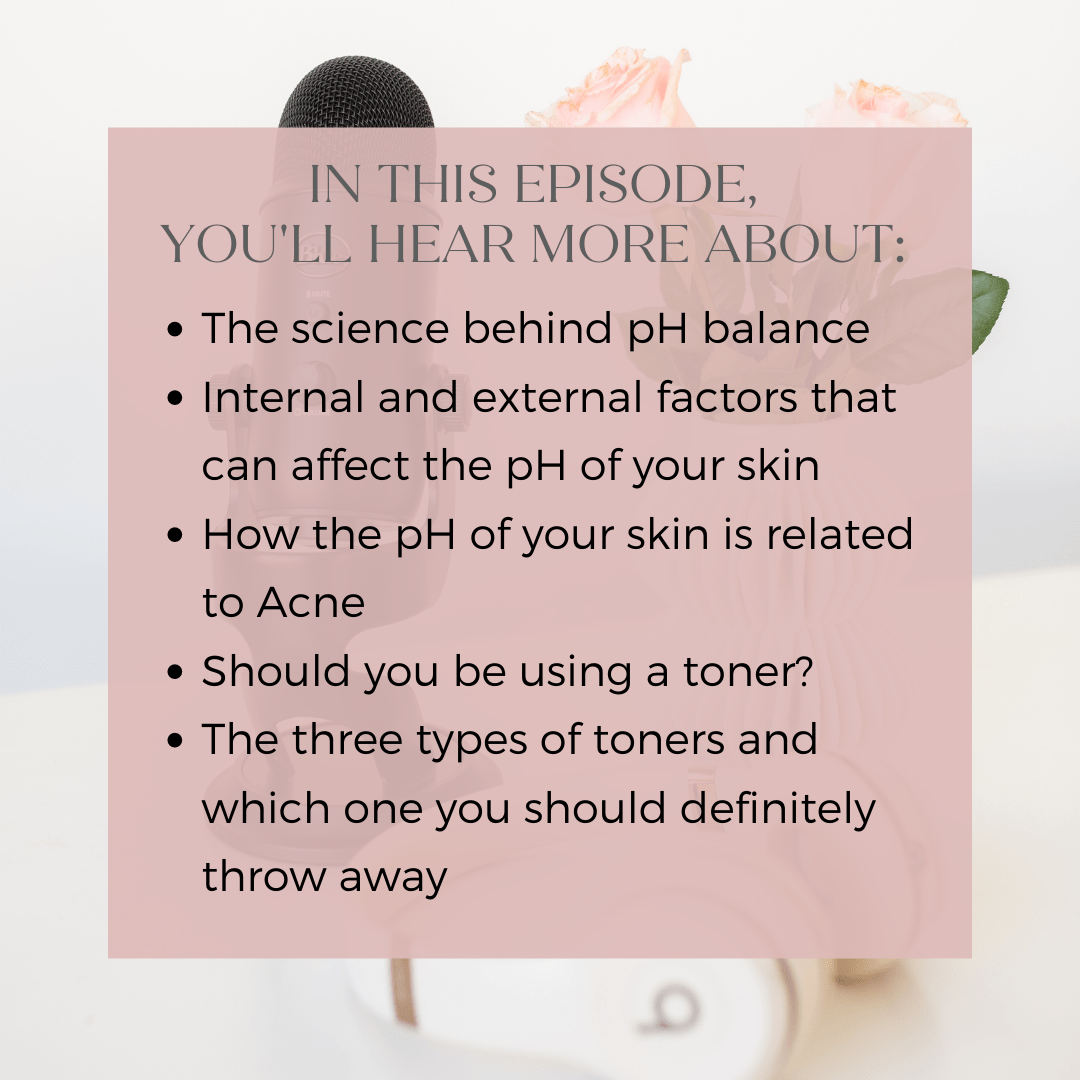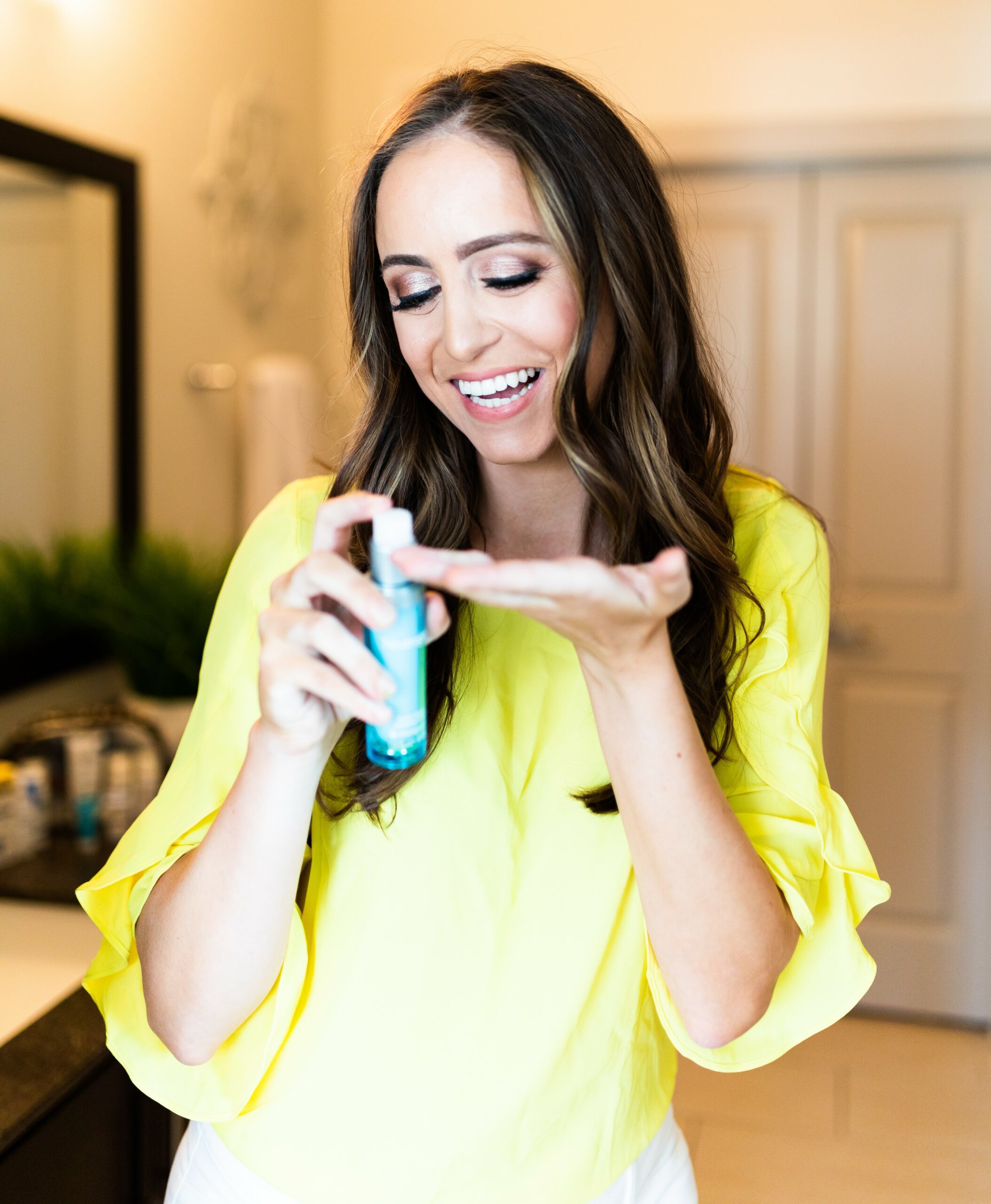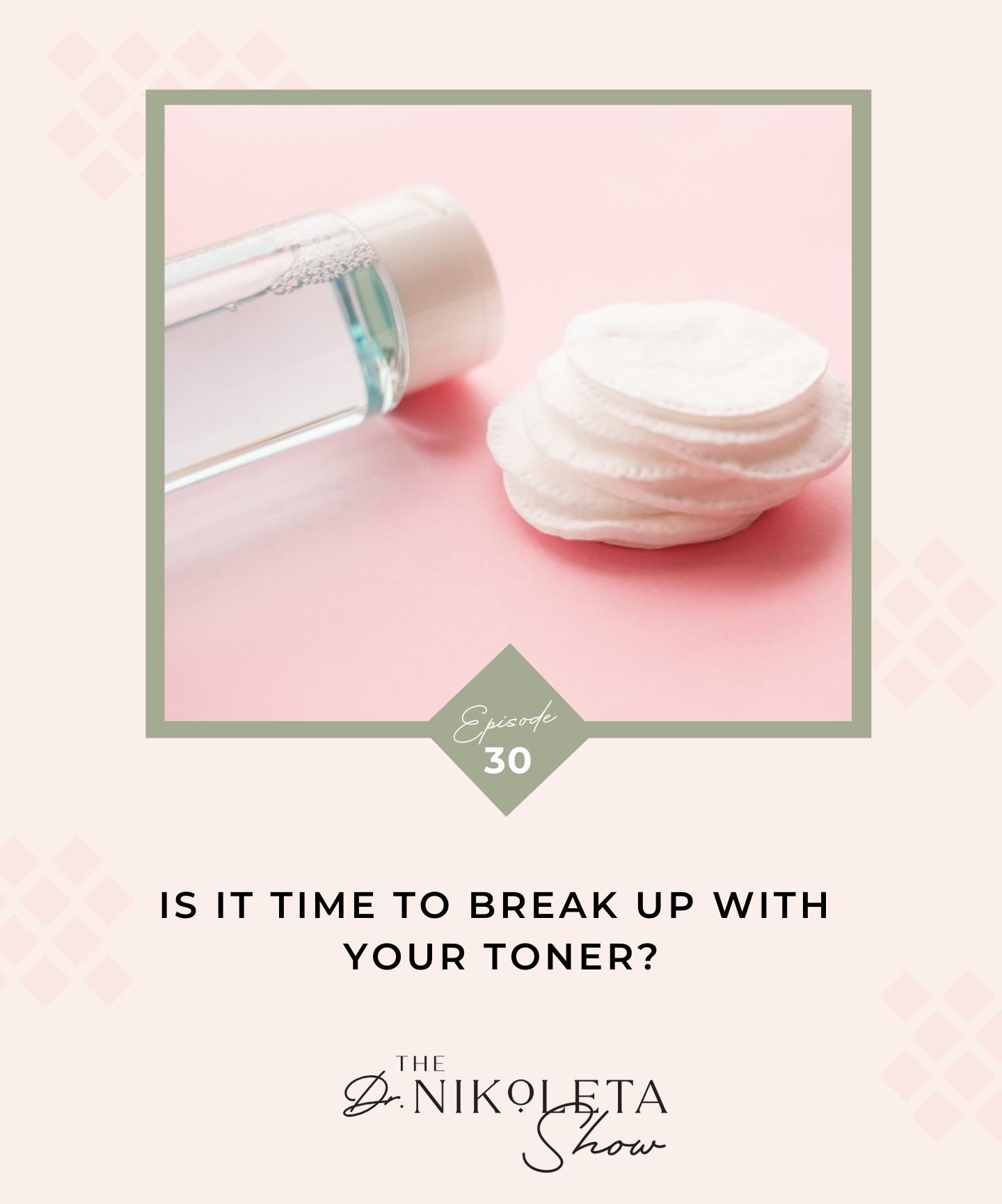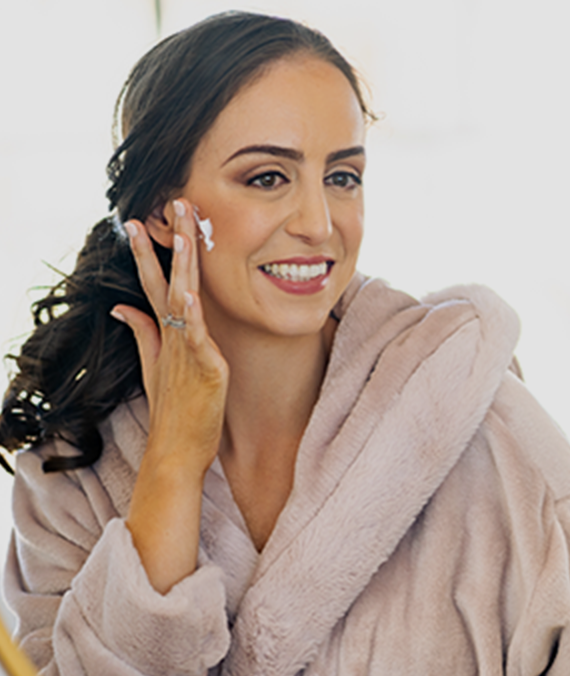Hello, tribe! Can you believe that we’re already in February 2021? It’s hard to believe that January is already over. For me, it’s really flown by, partly because I’ve been working on something really exciting to share with you all!
You may have bought or used products that claim to adjust the pH of your skin to natural, healthy levels. These products are typically called toners, and so many people use them as part of their skincare routine. Maybe you do too! However, are they really doing you a service? Are toners an essential part of your skincare success framework?
Today, we’re discussing several topics, including the pH of your skin, why it may be time to break up with your toner, the different types of toners, and what products you should use in your skincare regimen. Let’s get started!
The Science Behind pH (What Does It Mean?)
Before we get into what products you should use on your skin, we’ve got to back up a little. You may have heard me mention the terms “pH” and “pH levels” when it concerns your skin, but what does pH actually mean on a scientific level?
Basically, pH is a measure of how acidic or basic something is. The range goes from 0 to 14, with 7 being neutral. Anything below 7 is considered acidic, and anything above 7 is considered basic.
Our skin is typically more acidic, falling between the 4 – 6 range on the pH scale. But what effect does pH actually have on our skin?
#1: Skin Barrier Homeostasis
Homeostasis is just another word for balance — when something is in homeostasis, it is balanced and at rest. Skin barrier homeostasis refers to the balance between the top layer of skin and the layer of skin below it. In more scientific terms, it means that the differentiation of granular layer keratinocytes to corneocytes is balanced against the elimination of corneocytes at skin surface (a.k.a. desquamation). The pH of your skin affects whether or not your skin barrier remains in homeostasis.
#2: Stratum Corneum Integrity
Your skin pH also influences the strength of the topmost layer of your skin (i.e. stratum corneum). The outermost level of your skin is called the epidermis, and within the epidermis, there are several different layers. The outermost layer is called the stratum corneum. The pH of your skin will determine how strong the stratum corneum is, and this is extremely important to the structural integrity of your skin.
#3: Skin Moisture Contents
Additionally, your pH skin level influences the moisture contents of your skin. Depending on how acidic or basic your skin is, it’ll retain more or less moisture.
#4: Microbe Defense
The skin is one of your first lines of defense against harmful bacteria or other particles entering your system. Depending on the pH level of your skin, you’ll either be protected or weakened against harmful microbes.
Now that you know how much pH influences your skin, you’re probably wondering what you can do to ensure your skin pH levels are where they need to be! First of all — don’t worry! Your body has some natural systems in place to keep pH levels healthy.
Your Skin’s Natural pH Buffering System and Other Ways to Control Skin pH Levels
To keep your pH levels in check, your skin has an internal pH buffering system, which I think is incredible! Here are the different systems which keep your skin from becoming too basic:
- Free fatty acids
- Natural moisturizing factors
- Lactic acid
- Urocanic acid
These internal systems miraculously buffer skin pH levels to keep them healthy and balanced! However, there are several other factors that can help buffer pH levels as well. Here are some additional internal factors that affect pH levels:
- Age
- Gender
- Sweat and sebum
There are also some external factors that can affect your skin pH:
- Cleansers
- Cosmeceuticals
- Topical prescriptions
- UV exposure
- Diet
Depending on what types of cleansers and products you use on your skin, you can positively impact your skin pH levels and keep your skin healthy, moisturized, and protected against harmful microbes. However, if you use the wrong products or do not practice healthy skincare routines, you can increase your skin pH levels to higher than they need to be. What does a higher skin pH (more basic and less acidic) entail?
- Increase in inflammation and skin permeability
- Decrease in lipid synthesis
- Change in skin’s microbiome
- Increase in acne-causing bacteria
- Increased production of sebum with less fatty acids
- Decrease in ceramide production (your skin will become less moisturized and more inflamed)
When these changes occur, you’re left with dry and inflamed skin — which is something that nobody wants — or acne-covered skin, which also isn’t ideal.
You may have heard of balancing skin pH toners that are supposed to magically restore your skin pH levels back to normal — maybe you even use some! Let’s unpack what toners actually are and how they affect the pH levels of your skin.

Why We Don’t Need Toners for Skincare Success
Do you remember the 90s? They were before Instagram and everybody saying that they’re a verified skin expert. When I read magazines in the 90s, I would always read about that tried-and-true three-step skin routine — cleanse, tone, and moisture. I used to do it all the time! But today, I’m going to do my best to educate you on why you can take the second step — tone — out of your routine. Some of you may be upset about this, but I promise that my goal is to make sure you’re empowered to take care of your mind, body, and skin — toners aren’t going to help you do that.
Toners were originally created for a couple of reasons. The first reason was to rebalance our skin pH levels so that they remained slightly acidic. However, today’s cleansers are much more sophisticated at pH balancing, and they contain ingredients such as petrolatum, glycerin, triglycerides, and fatty acids (hint: remember that fatty acids are one of the body’s natural pH buffering systems).
The truth is, we don’t need toners anymore. We have excellent cleansers that can balance our pH levels more effectively! Here are some of my favorites:
I mentioned these products back in Episode #26 when I talked about different skin types and the products you should use for them. I’ve talked about these products and more in the blog, so be sure to check that out to see all my recommendations for cleansers categorized by skin type.
The second reason that toners were created was to tighten pores. Now, a lot of people claim to love the feeling of tight pores, but I’m sorry to break it to you — rubbing a harsh, astringent toner all over your skin to make it feel tight and clean is the absolute WORST thing you can do for your pores. I’m all about mindful and simple skincare, so instead of adding another product to your regimen, I recommend just taking the toner out. Instead, pick a gentle cleanser based on your skin type.

The Three Types of Toners (and Which One to Avoid)
Now, if you’re really set on using a toner because you love the way it feels, I understand, and I’m happy to give you my recommendation for a toner that will not ruin your skin! Here are the three most common types of toners and what they include:
#1: Active-Ingredient Toners
These toners contain active ingredients such as glycolic acid, salicylic acid, lactic acid, and Vitamin C. Again, most of the products you’re using, such as cleansers and creams, probably already contain these active ingredients, so it’s not really necessary to add a toner into your skincare regimen.
#2: Hydrating Toners
Hydrating toners contain ingredients such as hyaluronic acid and glycerin, which moisturize your skin. Again, it’s okay to use these, but it’s not really necessary if you use moisturizer or hydrating serum. You’ll get the same results with one less product in your skincare regimen. If I had to choose a toner, I would probably choose the hydrating type, but again, they aren’t really necessary.
#3: Astringent Toners
What does astringent even mean? Basically, astringent toners lead to the contraction of skin cells and other body tissues. Helllloo? Do we want our skin cells contracted — AKA do we want our skin cells to die? Astringent toners contain high amounts of denatured alcohol, which leads to drying skin. These toners often contain fragrances, which are also not good for your skin (listen to Episode #29 or read the blog to learn why to avoid fragrant skincare products).
I’ve had several patients who have used Witch Hazel in the past and loved it, but over time, it can really aggravate your skin by stripping its natural oils. If you have to include a toner in your skincare routine, avoid astringent toners at all costs. Better yet — save money and keep toners out of your skincare routine. Instead, invest in a good cleanser and moisturizer that are sure to give you all the skin benefits you desire!
Prioritize Your Skin’s pH Levels Today!
Tribe, I hope this blog gave you the information and tools you needed to start prioritizing your skin’s pH levels today! Really, it all comes down to following the skincare success habits we’ve talked about in the past and avoiding astringent toners.
If you have any questions about pH levels and want to hear more about the science behind them, don’t hesitate to reach out to me!
And if you’re looking to be part of a community of like-minded people who care about skincare success, check out the Millennial Doc Community on Facebook! We’re a gathering of entrepreneurs, healthcare workers, parents, and students who want to learn and grow. We’d love to have you join us!
Lastly, if you have an extra minute, please subscribe and leave a five-star review of the Millennial Doc podcast on Apple Podcasts. Every rating and review goes a long way to helping this podcast be found by other people looking to achieve the skin of their dreams!
Tribe, you’ve got this! Go Step Out with Confidence® and achieve the skin of your dreams!







Stay in the know
Dropping in with weekly self-love affirmations, inspo, and skin secrets from Dr. Nikoleta created with YOU in mind.